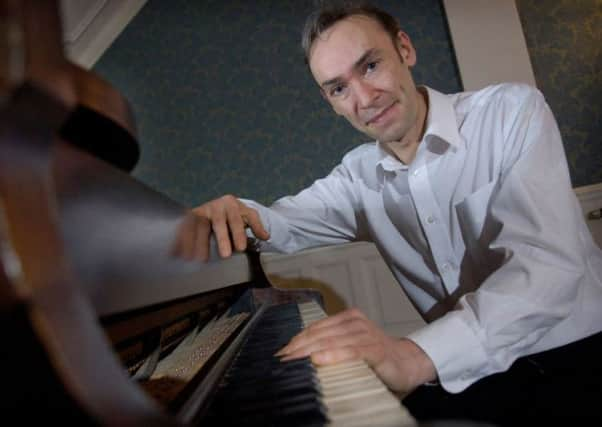Tributes paid to Edinburgh's Piano Man, Stuart Mitchell


Jazz pianist Stuart Mitchell enjoyed a hugely varied career – writing popular symphonies and deciphering musical code on the walls of the Da Vinci Code chapel.
He also played in the Capital’s legendary piano bar, Fingers on Frederick Street. He is believed to have died of lung cancer, aged 52.
Advertisement
Hide AdAdvertisement
Hide AdViolinist Feargus Hetherington said: “He was very, very kind and very, very supportive.
“He was a larger than life character who operated at 200 miles per hour – he was wonderfully pleasant to be around.
“I last saw him a couple of years ago. It’s just a shame I didn’t see him more recently but I didn’t know how serious it was – I didn’t realise until it was too late.”
The pair worked together on a Seven Wonders symphony and played the 2010 Edinburgh Festival together.
Advertisement
Hide AdAdvertisement
Hide Ad“He’ll probably be best remembered both for his incredible skills as a jazz pianist which he got from his father [Thomas] and for his very successful writing – that’s quite an achievement in its own right.”
Born on December 21, 1965, Mr Mitchell would go on to become a prolific pianist, producer and composer.
He was possibly best known for his Seven Wonders Suite in 2001. recorded by The Prague Symphony Orchestra and conducted by Mario Klemens.
In 2014, a new recording of The Mausoleum at Halicarnassus from Seven Wonders Suite performed by The Czech National Orchestra with conductor Paul Bateman was recorded by Deutsche Grammophon.
Advertisement
Hide AdAdvertisement
Hide AdThe work premiered in Prague in November 2006 and was performed by The Czech National Orchestra conducted by Paul Freeman at the Rudolfinum Concert Hall.
This major symphonic work put Mr Mitchell at number 181 in the Classic FM Hall of Fame 2017 and is regularly requested by their listeners.
The son of pianist and composer Thomas J. Mitchell, in 2005, father and son hit the headlines for deciphering a musical code of cymatics carved into the ceiling design of Rosslyn Chapel.
The process featured in a television documentary by The Discovery Channel in the USA and Channel 5 in the UK.
Advertisement
Hide AdAdvertisement
Hide AdThe chapel was made famous in Dan Brown’s best-selling novel, The Da Vinci Code.
It took Mr Mitchell senior 27 years of painstaking study to discover the pitches and tonality of rectangles and cubes adorning arches on the chapel ceiling – dubbed ‘frozen music.’
In 2008, Mr Mitchell released the first in his series of works called DNA Variations, music translated from Ancestral DNA sequences of various species.
He founded the firm Your DNA Song in 2005 to bring personalized DNA music to clients, a technique linked to sound healing therapy.
In 2010, he translated the DNA code of Ludwig Van Beethoven and on piano premiered the performance of the music at the Edinburgh Festival 2010 with Feargus Heatherington on Viola.